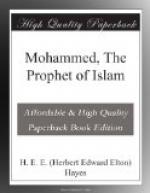The first Mosque, or meeting place, was built very soon after his arrival in Medinah, and he entered upon his priestly functions. As a matter of policy, he adopted many of the Jewish rites. These, however, he soon changed, for as the number of his followers increased, and he grew more and more independent of Jewish aid, he made every effort to show his natural aversion to the ancient people, who scorned his prophetic pretensions. In place of praying towards Jerusalem, his followers were commanded to turn their faces towards Mecca. The Fast of Atonement was abolished in favour of the month of Ramadan, while in substitution for the Jewish rite of sacrifice, the pagan slaying of victims was observed.
A considerable difference is to be noticed between the “revelations” of this period and those of Mecca. The latter were concerned with denunciations of idolatry; proofs of the Divine unity and attributes; legendary stories, and occasional lurid pictures of heaven and hell. The former are generally of a legislative character, mingled with the domestic affairs of the prophet, and guidance as to his military policy. The method of recording them, too, seems to have been systematised, for it is certain that a body of professional scribes were engaged in this work, and evidence is not wanting to show that these scribes were allowed to express the revelations in their own particular style. Discrepancies and inconsistencies abounded, but Mohammed seems to have allowed that he was not responsible, and to have stated that God had a perfect right to alter as He pleased, and even to apologise for errors! The policy of abrogation has its sanction in the text, “Whatever verses we cancel or cause thee to forget, we give thee better in their stead, or the like thereof.”
In his warlike policy, the prophet’s strategy reflects most discreditably upon his character, everything that was honourable and virtuous being sacrificed to the passion for conquest. When he needed help, he pretended friendship to those he hated; and then, becoming strong enough to be independent, did not hesitate, upon the slightest provocation or pretext, to turn his sword against them. This is particularly true of his treatment of the Jews, whom he at first befriended, but afterwards treated with barbarous injustice.
Within a very few months of their arrival in Medinah, the need of some method of support, other than the charity of the helpers, presented itself. The number of refugees was still increasing, and the demand for the ordinary necessities of life exceeded the supply. Mohammed, to his credit, shared the misery of his followers, and proved himself to be generous even when in want. In order to meet the need, the policy of despoiling the wealthy Meccan caravans was conceived, and carried out with some degree of success. The prophet at first exhibited a feeling of repugnance against such warfare, especially when the ancient pacific regulations of certain sacred months were violated.




